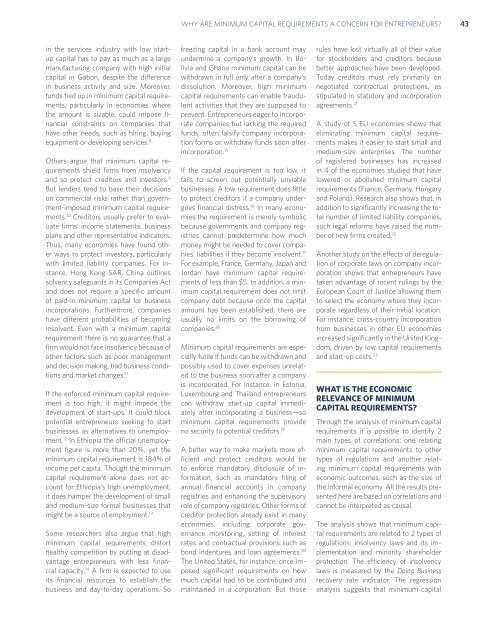1gGgw9ScK
1gGgw9ScK
1gGgw9ScK
Create successful ePaper yourself
Turn your PDF publications into a flip-book with our unique Google optimized e-Paper software.
WHY ARE MINIMUM CAPITAL REQUIREMENTS A CONCERN FOR ENTREPRENEURS? 43<br />
in the services industry with low startup<br />
capital has to pay as much as a large<br />
manufacturing company with high initial<br />
capital in Gabon, despite the difference<br />
in business activity and size. Moreover,<br />
funds tied up in minimum capital requirements,<br />
particularly in economies where<br />
the amount is sizable, could impose financial<br />
constraints on companies that<br />
have other needs, such as hiring, buying<br />
equipment or developing services. 8<br />
Others argue that minimum capital requirements<br />
shield firms from insolvency<br />
and so protect creditors and investors. 9<br />
But lenders tend to base their decisions<br />
on commercial risks rather than government-imposed<br />
minimum capital requirements.<br />
10 Creditors usually prefer to evaluate<br />
firms’ income statements, business<br />
plans and other representative indicators.<br />
Thus, many economies have found other<br />
ways to protect investors, particularly<br />
with limited liability companies. For instance,<br />
Hong Kong SAR, China outlines<br />
solvency safeguards in its Companies Act<br />
and does not require a specific amount<br />
of paid-in minimum capital for business<br />
incorporations. Furthermore, companies<br />
have different probabilities of becoming<br />
insolvent. Even with a minimum capital<br />
requirement there is no guarantee that a<br />
firm would not face insolvency because of<br />
other factors such as poor management<br />
and decision making, bad business conditions<br />
and market changes. 11<br />
If the enforced minimum capital requirement<br />
is too high, it might impede the<br />
development of start-ups. It could block<br />
potential entrepreneurs seeking to start<br />
businesses as alternatives to unemployment.<br />
12 In Ethiopia the official unemployment<br />
figure is more than 20%, yet the<br />
minimum capital requirement is 184% of<br />
income per capita. Though the minimum<br />
capital requirement alone does not account<br />
for Ethiopia’s high unemployment,<br />
it does hamper the development of small<br />
and medium-size formal businesses that<br />
might be a source of employment. 13<br />
Some researchers also argue that high<br />
minimum capital requirements distort<br />
healthy competition by putting at disadvantage<br />
entrepreneurs with less financial<br />
capacity. 14 A firm is expected to use<br />
its financial resources to establish the<br />
business and day-to-day operations. So<br />
freezing capital in a bank account may<br />
undermine a company’s growth. In Bolivia<br />
and Ghana minimum capital can be<br />
withdrawn in full only after a company’s<br />
dissolution. Moreover, high minimum<br />
capital requirements can enable fraudulent<br />
activities that they are supposed to<br />
prevent. Entrepreneurs eager to incorporate<br />
companies but lacking the required<br />
funds, often falsify company incorporation<br />
forms or withdraw funds soon after<br />
incorporation. 15<br />
If the capital requirement is too low, it<br />
fails to screen out potentially unviable<br />
businesses. A low requirement does little<br />
to protect creditors if a company undergoes<br />
financial distress. 16 In many economies<br />
the requirement is merely symbolic<br />
because governments and company registries<br />
cannot predetermine how much<br />
money might be needed to cover companies’<br />
liabilities if they become insolvent. 17<br />
For example, France, Germany, Japan and<br />
Jordan have minimum capital requirements<br />
of less than $5. In addition, a minimum<br />
capital requirement does not limit<br />
company debt because once the capital<br />
amount has been established, there are<br />
usually no limits on the borrowing of<br />
companies. 18<br />
Minimum capital requirements are especially<br />
futile if funds can be withdrawn and<br />
possibly used to cover expenses unrelated<br />
to the business soon after a company<br />
is incorporated. For instance, in Estonia,<br />
Luxembourg and Thailand entrepreneurs<br />
can withdraw start-up capital immediately<br />
after incorporating a business—so<br />
minimum capital requirements provide<br />
no security to potential creditors. 19<br />
A better way to make markets more efficient<br />
and protect creditors would be<br />
to enforce mandatory disclosure of information,<br />
such as mandatory filing of<br />
annual financial accounts in company<br />
registries and enhancing the supervisory<br />
role of company registries. Other forms of<br />
creditor protection already exist in many<br />
economies, including corporate governance<br />
monitoring, setting of interest<br />
rates and contractual provisions such as<br />
bond indentures and loan agreements. 20<br />
The United States, for instance, once imposed<br />
significant requirements on how<br />
much capital had to be contributed and<br />
maintained in a corporation. But those<br />
rules have lost virtually all of their value<br />
for stockholders and creditors because<br />
better approaches have been developed.<br />
Today creditors must rely primarily on<br />
negotiated contractual protections, as<br />
stipulated in statutory and incorporation<br />
agreements. 21<br />
A study of 5 EU economies shows that<br />
eliminating minimum capital requirements<br />
makes it easier to start small and<br />
medium-size enterprises. The number<br />
of registered businesses has increased<br />
in 4 of the economies studied that have<br />
lowered or abolished minimum capital<br />
requirements (France, Germany, Hungary<br />
and Poland). Research also shows that, in<br />
addition to significantly increasing the total<br />
number of limited liability companies,<br />
such legal reforms have raised the number<br />
of new firms created. 22<br />
Another study on the effects of deregulation<br />
of corporate laws on company incorporation<br />
shows that entrepreneurs have<br />
taken advantage of recent rulings by the<br />
European Court of Justice allowing them<br />
to select the economy where they incorporate<br />
regardless of their initial location.<br />
For instance, cross-country incorporation<br />
from businesses in other EU economies<br />
increased significantly in the United Kingdom,<br />
driven by low capital requirements<br />
and start-up costs. 23<br />
WHAT IS THE ECONOMIC<br />
RELEVANCE OF MINIMUM<br />
CAPITAL REQUIREMENTS?<br />
Through the analysis of minimum capital<br />
requirements it is possible to identify 2<br />
main types of correlations: one relating<br />
minimum capital requirements to other<br />
types of regulations and another relating<br />
minimum capital requirements with<br />
economic outcomes, such as the size of<br />
the informal economy. All the results presented<br />
here are based on correlations and<br />
cannot be interpreted as causal.<br />
The analysis shows that minimum capital<br />
requirements are related to 2 types of<br />
regulations: insolvency laws and its implementation<br />
and minority shareholder<br />
protection. The efficiency of insolvency<br />
laws is measured by the Doing Business<br />
recovery rate indicator. The regression<br />
analysis suggests that minimum capital



